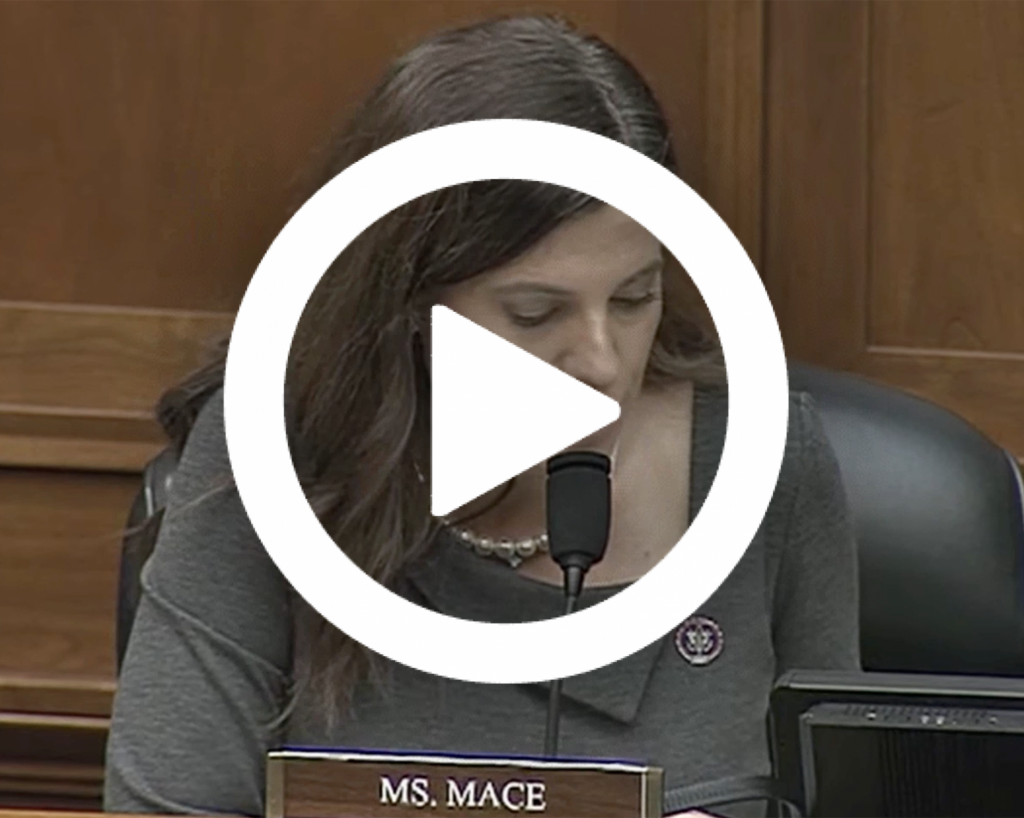Mace: All Americans, Especially Women and Girls, Deserve to Realize Their Full Potential
WASHINGTON – Today, the Subcommittee on Civil Rights and Civil Liberties held a hearing to examine the neglected epidemic of missing BIPOC women and girls. In her opening statement, Subcommittee Ranking Member Nancy Mace (R-S.C.) emphasized the importance of the hearing and how all Americans, especially women and girls, deserve to realize their full potential and chase the American Dream. However, she noted how far too many women fall victim to violent criminal activities, sex trafficking, and domestic violence.
Mace highlighted findings from the Centers for Disease Control, which show one in four women suffer from partner violence with a higher proportion of survivors being women of color. She advocated for improved access to education and economic opportunities for all women to decrease their risk of being targeted by all types of violence. Mace concluded by stating everyone deserves to live in a society free from the fear of violent crimes and expressed hope that the hearing could illustrate what can be done to empower women and girls to prevent these tragedies.
The remarks as prepared for delivery are below:
Thank you, Chairman Raskin.
I thank the Chairman for holding today’s hearing on such an important issue. All Americans, especially women and girls, deserve to realize their full potential in this country and achieve their American Dream.
But far too often, violent criminal activities and sex trafficking serve to limit opportunities and extinguish lives.
A shockingly high number of women and girls will be the victim of the tragedies of child abuse, domestic violence, sexual assault, or human trafficking during their lifetime.
According to the Centers for Disease Control and Prevention, intimate partner violence has affected or will affect one in four women in the United States. And half of all female homicide victims in the United States are killed by a current or former male intimate partner.
In my home state of South Carolina, there were 57 homicides related to domestic violence in 2021 alone. According to the South Carolina Coalition Against Domestic Violence and Sexual Assault, the femicide rate in South Carolina is over twice the national average.
The one in four number I mentioned previously is only for the general population. In fact, there are a higher proportion of survivors of domestic violence among women of color, with 35% of Native American women estimated to be victimized by rape, physical assault, or stalking, by an intimate partner, in their lifetime.
In New York City alone, despite only making up 20% of the population, Black women were 45% of domestic violence related homicide victims.
Women and girls are also frequently targeted by human traffickers, especially by sex traffickers who prey on the most vulnerable.
These tragedies are particularly acute among women of color.
For example, despite only making up 8% of the population in South Dakota, Native women are 40% of sex trafficking victims in that State.
In Louisiana, almost half of sex trafficking survivors are Black women and girls, even though they make up only 19% of Louisiana’s youth population.
Nationwide, Black women and girls are estimated to be about 40% of domestic sex trafficking victims in the United States. And it is estimated that there are currently between 64,000 and 75,000 missing Black women and girls in the United States, many of whom may have been targeted by sex traffickers.
These crimes subject victims and their communities to great costs. The CDC estimates the total economic impact of domestic violence to be $3.6 trillion, which includes medical services for injuries, lost productivity from work, and criminal justice costs.
Tragically, the personal cost for every victim of domestic violence is greater than $100,000 over a woman’s lifetime on average.
This is an important hearing. I look forward to learning from the witnesses today about their own experiences with these tragedies, and what they and their organizations are doing to raise awareness of these issues, to reduce vulnerability to being targeted, and to ensure that survivors can achieve their dreams.
I am especially interested in what policies we should be advocating for to improve access to education and economic opportunities for all women to decrease vulnerability and risk of being targeted by criminals.
All of us deserve to live in a society free from the fear of falling victim to violent crimes. I hope this hearing will illustrate what can be done to empower women and girls to prevent these tragedies and help survivors realize their American Dream.
Thank you, Mr. Chairman, and I yield back.
